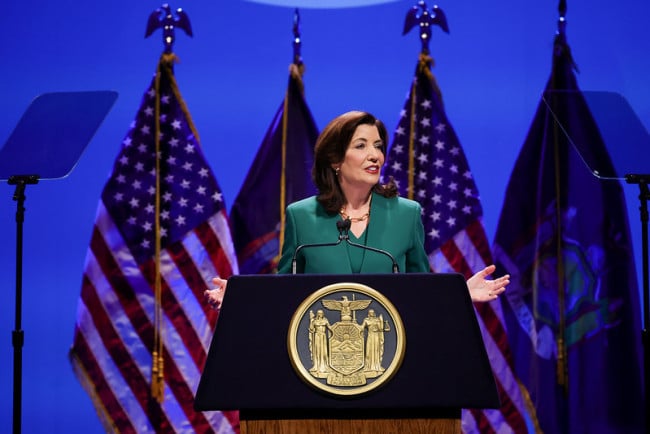Could a proposed bill to help New York tenants buy their building finally become law?
- The Tenant Opportunity to Purchase Act would give tenant organizations first crack at making an offer on their buildings
- The legislation has been kicking around since 2021, and advocates and state reps hope it is approved this year

Under the proposed law, tenants would have to partner with a nonprofit to make a “bona fide” offer on the building.
iStock
Many New York City renters dream of one day owning an apartment—but what if you and your neighbors had an opportunity to buy your rental building?
A New York state bill, the Tenant Opportunity to Purchase Act (TOPA) would make that dream a reality by giving tenant organizations a right to make an offer on their apartment building. But the legislation, first introduced in 2021, has languished in Albany for years without passing. Housing advocates and state representatives hope 2025 is the year to change that.
"The Tenant Opportunity to Purchase Act will help tenants build intergenerational wealth and preserve affordable housing for New Yorkers,” said State Senator Zellnor Myrie, who sponsored the bill and is running for NYC mayor.
“TOPA is an important tool to ensure our neighbors can remain in their homes, and I look forward to getting it across the finish line this session," he said.
Renters face a tough market
It’s not an easy time to be a renter in NYC.
Rents hit an unusual high in February, and in many cases, landlords are offering apartments to the highest bidder. Adding to the troubles of many low-income renters are a growing number of private equity landlords—often groups more interested in hiking a building’s earning power than providing housing.
To counter this trend, state lawmakers are pushing for TOPA. The bill would give tenants a right to make an offer to buy their building when it’s up for sale, though that right would not apply to certain exempt buildings, including government owned-property, dorms, hotels, co-ops, and condos.
“We’re in a housing crisis like never before,” said Elise Goldin, a community land trust campaign organizer with the New Economy Project. “Addressing who owns these buildings, and taking them—as much as possible—out of a for-profit ownership structure is the structural, long-term solution.”
That’s the hope of tenants in two Hell’s Kitchen buildings that were previously owned by Daniel Ohebshalom, one of the city’s “worst landlords” who was sent to Rikers Island last year. Renters at 438 and 440 West 45th Street—who have complained of hot water outages, pests, and broken locks, according to city data—want to buy their buildings, and they plan to rally in support of TOPA on Saturday.
How TOPA could help
Under TOPA, tenants would have to form a tenant organization and join forces with a nonprofit partner to make a “bona fide” offer on the building—aka terms similar to that of a competing buyer or the property’s appraised value.
Renters would also get the opportunity to match an offer from a third party. And owners might be incentivized to go with a tenant proposal because landlords may qualify for tax breaks when selling to a nonprofit.
But buying a building is a complicated process, and the program depends on partnerships with tenant organizations to make sure those involved get the right support and guidance.
Under the Assembly version of the bill, a landlord would be required to disclose information about operating costs, necessary repairs, and mortgages on the building. Qualified nonprofits can still make an offer on buildings even if tenants waive their rights to make their own bid, according to the Assembly bill’s text.
Tenants would also have to agree to keep the building "permanently affordable,” under both the Senate and Assembly versions of TOPA. That means limiting future rent increases and sales prices of individual interests in the property, according to the legislation.
Housing on the ballot
There's no guarantee the bill will pass this year. TOPA has been kicked around Albany for four years and laughed off by the real estate industry. But Julie Colon, lead housing organizer for the Northwest Bronx Community and Clergy Coalition, was optimistic about turning TOPA into law.
Colon pointed to Governor Kathy Hochul’s recent State of the State address as an example of growing support for curtailing large investors from buying up small properties. In her address, Hochul proposed mandating that large corporations wait 75 days before making an offer on a single- or two-family home.
TOPA would work similarly, Colon said, by giving tenants time to form an association and make an offer.
“We thought that was a really good symbol that concepts like TOPA…are something that are really favorable,” Colon said. “It's been great to see that it's been something that people and legislators are really interested in.”
Housing has also become a core issue in the 2025 NYC mayoral race, with nearly every candidate pitching plans to build and preserve affordable apartments. Myrie sponsored TOPA in the Senate and Queens Assembly member Zohran Mamdani—who is also running for mayor—is a co-sponsor of TOPA in the Assembly.
But it’s yet unclear if that growing interest will translate to a TOPA with teeth. As far as Colon knows, the current budget negotiations do not include the $250 million in funding for TOPA tenant advocates have called for.
While the funds aren’t necessary to establish TOPA as a legal right, they would be helpful to kickstart the program and make repairs to aging buildings, Colon said. (Michael McKee, a longtime tenant organizer and treasurer of the Tenants Political Action Committee, said the funding was needed to “get this program off the ground.”)



























